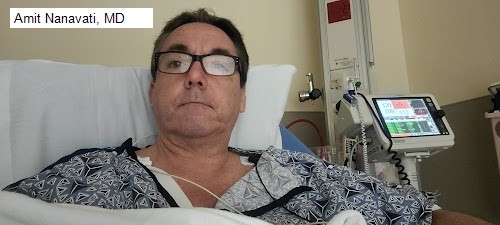1 /5 Gerald A: I had a catheterization procedure done by Dr. Amit Nanavati on 05/26/22. I had been suffering from afib and was referred by Dr. Huijian Wang to Dr. Nanavati for the catheterization procedure (Wang had done a failed cardioversion and judged that my heart was too weak for an ablation procedure) The catheterization procedure used "contrast", a dye injected to be able to see the heart action. According to my Primary Care Physician doctor, it is a very bad thing to administer contrast to someone with kidney failure and he strictly avoided ordering procedures with contrast because of my chronic kidney failure. Wang and Nanvadi of course knew of my chronic kidney disease (CKD) and issues with using contrast but neither doctor advised me of the issue prior to the procedure. Neither Wang or Nanavadi in fact provided any rationale for my doing a catheterization; I should have been more alert to this but was not sufficiently cautious prior to agreeing to the procedure. I found out that contrast was being used at the very last minute at the very beginning of the procedure (anesthesia was about to start) and told the anesthesiologist doctor (unfortunately his name is not included in the procedure notes) and Dr. Nanavati NOT to go ahead with the procedure, but they went ahead anyway. Notes from the procedure say "All participants affirmatively agreed to proceed with this study". This is an outright lie. The notes also say "The risks, benefits, and alternatives to the procedure were explained to the patient and informed consent was obtained." This is an outrageous lie: the risks and benefits to the procedure were NEVER explained. After the procedure I noted that my kidneys were not producing any urine for almost a full day after the procedure so I went to the emergency room on 5/27/23, where the ER doctors noted that my kidney function had dramatically worsened after the procedure. My kidney function glomerular filtration rate (GFR) reading after the catheterization went from above 15 to 8, which signifies, according to my nephrologist doctor, "end stage kidney failure", a death sentence. When I told Dr. Nanavati about my visit to the Emergency Room after the catheterization procedure in the post-op on 06/27/22 he said nothing. In fact, he just stood by the door wanting to make a quick exit and offered no post-up updates at all. He just left. Nanavadi is not only guilty of malpractice he is guilty of manslaughter. The kidney failure has caused pain throughout my body (mostly wrists, hands, fingers, legs, possibly gout) and low hemoglobin needing shots continuously for the two years after the procedure and getting progressively worse. Nanavati caused "Contrast-Induced Nephropathy" with the procedure, which is a condition understood and documented, e.g. see "Contrast-Induced Nephropathy" by T. G. Gleason and "Contrast-Induced Nephropathy, Pathophysiology, Risk Factors, & Prevention" by M. A. Hossain. Nanavati should never have proceeded with the catheterization procedure and Wang should never have recommended it.


